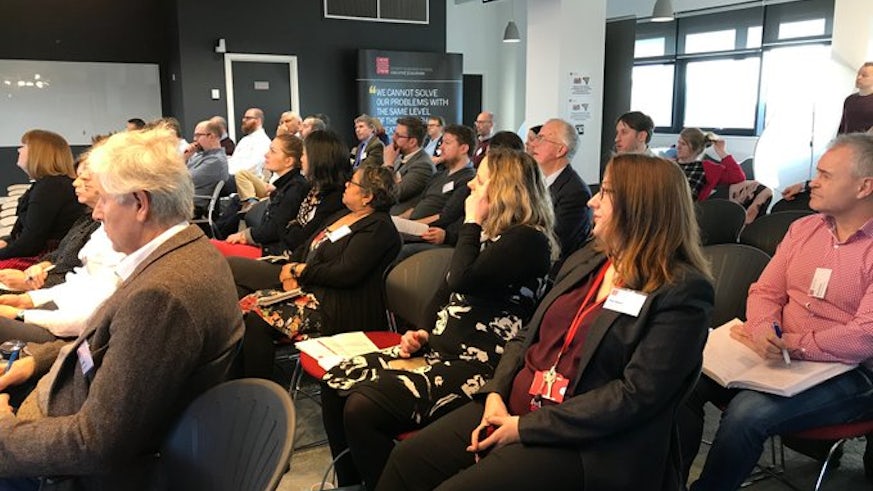Re-energising Wales
27 February 2020

An Institute for Welsh Affairs (IWA) report on deploying renewable energy in Wales to combat the climate emergency and benefit the economy was the focus of the latest in Cardiff Business School’s Breakfast Briefing Series.
Auriol Miller, Director of the IWA, got proceedings underway by explaining the aims and objectives of the Institute’s work on the economic opportunities and challenges for Wales’ renewable energy future.
She said: “One of the themes of IWA activity under which this work sits, is to realise a successful, clean, green and fair economy for Wales…”

“We’re interested in the bright ideas that can transform Wales and bringing people together across sectors – public, private, academic, third sector, community groups and interested individuals – as well as spanning policy areas. And so that was the context for this piece of work.”

Making progress
Auriol outlined the detail of a three-year programme of work that built an evidence base for the assertions made in the IWA’s final report.
This included:
- Mapping building energy demand across Wales.
- A case study on Swansea Bay City Region.
- An all-Wales assessment of economic impact, investments and returns – carried out with Professor Calvin Jones, Dean of Public Value and External Affairs at Cardiff Business School.
- A study of social and community issues and ownership.
- A study on regulatory on political and regulatory levers.
She concluded her introduction, saying: “The point about what we do is that it is not the answer, it is an answer. And we tried to do something that was doable now without excuses, because that’s the point of making progress.”
Next Hywel Lloyd, a member of the Re-energising Wales steering group, ran through the energy system which currently exists in Wales.
Anecdotally, he explained that: “Over the course of the project, every now and again we’d have a conversation with someone who would say something like ‘oh, you shouldn’t start from here…’.
“Well, we have to start from here, because these are the things we’ve got.”
With the context outlined, his presentation focused on the IWA’s report and the 10 essential actions that need to be delivered between 2019-2035 to achieve 100% renewables in Wales.

Before bringing the briefing to close with a questions and answer session, Hywel sought to define the foundational economy.
Through multiple definitions, he characterised it as:
- Everyday
- Present
- Place-based
- Anchored
- Barter-able
- And, circular.
Relating the concept of a foundational economy to energy, Hywel explained that: “Clearly energy is an everyday economic activity and renewables are increasingly present in places that people are, because of the diffuse and decentralising nature of them...”

“You can absolutely deploy renewables close to use in a completely different way to the fossil fuel-based system, they can be anchored or bartered, and, of course, they have massive potential to be circular rather than extractive.”
Following their presentations, Auriol and Hywel fielded questions on supply and demand, offshore energy and development.
Cardiff Business School's Breakfast Briefing Series is a network of events which enables business contacts to find out more about the latest research and key developments from industrial partners.
If you were unable to attend, watch this recording of the event.
This event took place before the COVID-19 pandemic.
Share this story
Enabling our business contacts to find out more about latest business research and key developments from industry partners and practitioners.



